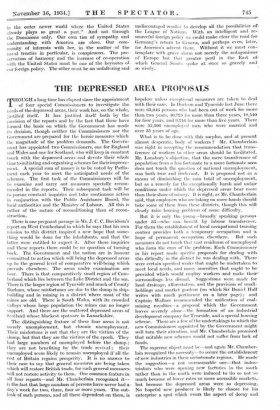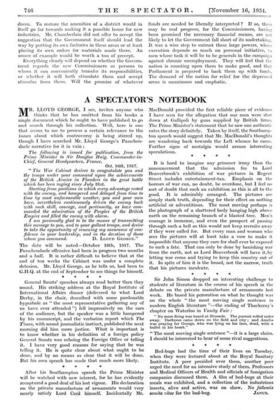THE DEPRESSED AREA PROPOSALS
THOUGH a long time has elapsed since the appointment of four special Commissioners to investigate- the needs of the depressed. areas, their work has, on the whole, justified itself. It. has justified itself both by the precision of . the reports and by the fact that these have formed. the basis on which the Government has made its decision; though neither the Commissioners nor the Government are prepared for the heroic measures which the magnitude of the problem demands. The Govern- ment has appointed two Commissioners, one for England and WideS and one for Scotland, who will keep in constant touch with the depressed =areas and devote their whole time to initiating and organizing schemes.for their improvp meat. A special sum of money is to be voted by Parlia- ment each year to meet the anticipated needs of the schemes. The first task of the CommiSsioners will be to examine and carry out measures specially recom- mended in the reports. Their subsequent task will be to pursue-constant inquiries and take continuous action in conjunction with the Public Assistance Board, the local authorities and the Ministry of Labour. All this is rather of the nature of reconditioning than of recon- struction.
There is one pregnant passage in Mr. J. C. C. Davidson's report on West Cumberland in which he says that his own mission to this district inspired a new hope that some- thing would be done for the inhabitants, and that the latter were entitled to expect it. After these inquiries and these reports there could be no question of turning back. The Government and the nation are in honour committed to action which will bring the depressed areas up to the general level of comparative well-being which prevails elsewhere. The areas under examination are four. There is that comparatively small region of Cum- berland which lies between the Lake District and the sea. There is the larger region of Tyneside and much of County Durham, whose misfortunes are due to the slump in ship- building and in mining in a district where most of the mines are old. There is South Wales, with its Crowded. valleys whose large population the mines can no longer support. And there are the scattered depressed areas of Scotland whose blackest spots are in Lanarkshire.
The distinguishing feature of these four areas is not- merely unemployment, but chronic unemployment. Their. misfortune is not that they are the victims of the slump, but that they are the victims of the epoch. They had large numbers of unemployed before the slump ;- they are not benefiting by the trade revival ; their unemployed seem likely to remain unemployed if all the rest of Britain regains prosperity. It is no answer to' their case to say that general measures are being taken. which will restore British trade, for such general measures! will not restore activity to them. One common feature in all four reports=and Mr. Chamberlain recognized it— is the fact that large numbers of persons have never had a, day's work for two, three, four or more years. The out- look of such persons, and all those dependent on them, is hopeless unless exceptional measures arc taken to deal with their case. In Durham and Tyneside last June there were 63,046 persons who had been out of work for more- than two years, 40,m for more than three years, 18,540 for four years, and 9,246 for more than five years. There were 52,506 unemployed men who were married and . over 35 years of age.
What is to be done with this surplus, and at present almost desperate, body of workers ? Mr. Chamberlain was right in accepting the recommendation that trans- ference of workers to other areas should be facilitated. Mr. Lansbury's objection, that the mere transference of population from a less fortunate to a more fortunate area doeS- not touch the question of national unemployment, was both true and irrelevant. It is proposed not as a means of diminishing the sum total of unemployment, but as a remedy for the exceptionally harsh and unfair conditions under which the depressed areas bear more than their share of misery. It is right, as Mr. Chamberlain said, that employers who are taking on more hands should take some of them from these districts, though this will clearly raise housing problems of some difficulty.
But it is only the young—broadly speaking persons under 35 who can benefit by labour transference. For them the establishment of local occupational training centres provides both a temporary occupation and 'a hope of permanent occupation elsewhere. But such measures do not touch that vast residuum of unemployed who form the crux of the problem. Each Commissioner in his report made specific proposals for dealing with- this difficulty in the district he was dealing with. There' were certain specified works that might be undertaken to' meet local needs, and many amenities that ought to be' provided which would employ workers and make their' surroundings less dismal. Suggestions were made for land drainage, afforestation, and the provision of small- holdings and market gardens (on which Sir Daniel Hall' writes with much pertinence on a later page) ; and Captain Wallace recommended the unification of coal- mining royalties—a proposal which the Government leaves severely alone—the formation of an industrial' development company for Tyneside, and a special housing' scheme. These are a few of the undertakings to which the new Commissioners appointed by the Government might well turn their attention, and Mr. Chamberlain promised' that suitable new schemes would not suffer from lack of funds.
The supreme object must be—and again Mr. Chamber-- lain recognized the necessity—to secure the establishment' of new industries in these unfortunate regions. He made' the suggestion—a not unreasonable• one—that indus-- trialists who were opening new factbrics in the south rather than in the north were induced to-do so not 'so much because of lower rates or more accessible markets,- -but because the depressed areas were so depressing.: No hopeful new producer is likely to choose for his. enterprise a spot which wears the aspect of decay and doom. To restore the amenities of a district would in itself go far towards making it a possible home for new industries. Mr. Chamberlain did not offer to accept the suggestion that the Government itself should lead the way by putting its own factories in these areas or at least placing its own orders for materials made there. An ounce of example would be worth a ton of precept.
Everything clearly will depend on whether the Govern- ment regards the new Commissioners as persons to whom it can conveniently transfer its responsibilities, or whether it will both stimulate them and accept stimulus from them. Will the promise of whatever funds are needed be liberally interpreted ? If so, there may be real progress, for the Commissioners, having been promised the necessary financial means, are not likely to let the Government fall short of its undertaking. It was a wise step to entrust these large powers, whose execution depends so much on personal initiative, to men whose task it will be to be generals in the campaign against chronic unemployment. They will feel that the nation is counting upon them to make good, and that Parliament is prepared to back them up with funds. The demand of the nation for relief for the depressed areas is unanimous and emphatic.







































 Previous page
Previous page